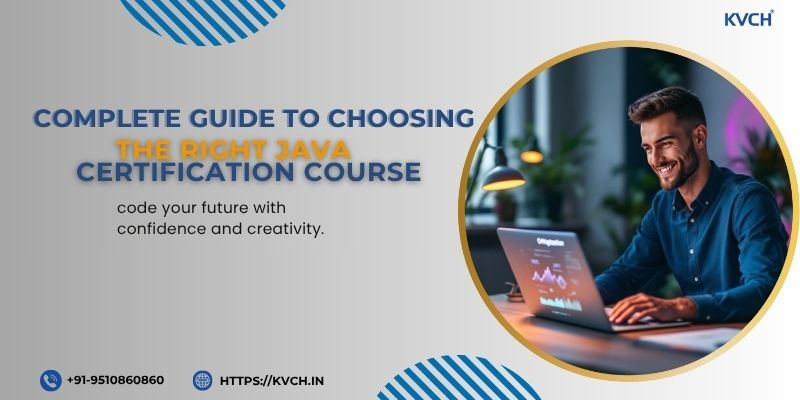Complete Guide to Choosing the Right Java Certification Course
- Rohit singh
- Aug 2
- 5 min read

Java is one of the most enduring and versatile programming languages, powering everything from mobile apps to enterprise systems. Its "Write Once, Run Anywhere" philosophy, enabled by the Java Virtual Machine (JVM), makes it a favorite among developers worldwide. However, in a competitive tech industry, simply knowing Java isn’t enough. A Java certification can elevate your resume, validate your skills, and open doors to lucrative career opportunities.
This comprehensive guide explores how to choose the right Java certification course, covering Advanced Java Certification, Java Course in Delhi, Full Stack Java Developer Training, and Java Course Fees. Whether you’re a beginner or a seasoned developer, this article will help you make an informed decision.
Why Java Certifications Are Worth It
Java certifications, particularly those from Oracle, are globally recognized credentials that demonstrate your proficiency in Java programming. According to industry insights, certified Java professionals often see improved job prospects, including promotions and salary increases. With over 18 million developers using Java, certifications help you stand out in a crowded market. They also encourage continuous learning, ensuring you stay updated with the latest Java technologies.
Understanding Java Certifications
Oracle’s Java certification path is structured into several levels, each catering to different skill sets and career stages. Here’s a breakdown of the main certifications:
Oracle Certified Junior Associate (OCJA): Designed for beginners, such as students or those new to programming. It covers foundational concepts like Java syntax and basic programming logic.
Oracle Certified Associate (OCA): An entry-level certification for professionals with some programming experience. It focuses on core Java concepts, including data types, operators, loops, arrays, and object-oriented programming (OOP). Available for Java SE 8, 11, and 17.
Oracle Certified Professional (OCP): Aimed at experienced developers, this certification delves into advanced topics like multithreading, concurrency, Java I/O, and database connectivity. It’s available for Java SE 8, 11, 17, and Java EE 7.
Oracle Certified Master (OCM): A rare, expert-level certification for seasoned professionals, though less common today.
Oracle Certified Expert (OCE): Focuses on specialized areas like Java EE components (e.g., Servlets, JSP).
Each certification requires passing one or more exams, typically costing $245–$400. The exams test both theoretical knowledge and practical application, making preparation through structured courses essential.
Exploring Advanced Java Certification
An Advanced Java Certification Course is ideal for developers who have mastered core Java and want to specialize in enterprise-level applications. These courses build on foundational certifications like OCA or OCP and cover complex topics in Java Enterprise Edition (Java EE). Key areas include:
Servlets and JavaServer Pages (JSP): For building dynamic web applications.
Enterprise JavaBeans (EJB): For component-based development in enterprise systems.
Java Database Connectivity (JDBC): For integrating Java applications with databases.
Web Services: For creating and consuming APIs for interoperability.
Frameworks like Spring and Hibernate: For simplifying development and enhancing scalability.
Who Should Pursue It?
Experienced Java developers aiming for senior roles.
Professionals working on enterprise applications or web development.
Those seeking to master frameworks like Spring Boot for modern application development.
Benefits:
Enhanced skills in building scalable, secure applications.
Higher earning potential, with certified professionals often commanding salaries above $80,000 annually.
Recognition as an expert in Java-based enterprise solutions.
Courses like those offered by Coursera, Udemy, or NareshIT provide comprehensive training in these areas, often with hands-on projects to reinforce learning.
Java Courses in Delhi: Top Options
For those in Delhi, a Java Course in Delhi offers access to some of India’s top training institutes. These institutes provide both core and advanced Java training, often with practical projects and placement support. Here are some notable options:
APTRON Solutions: Offers comprehensive Java courses with live projects and expert trainers with over 8 years of experience. Known for its placement assistance.
KVCH: Focuses on practical learning with a robust curriculum covering core and advanced Java. Offers flexible schedules and job placement support.
DUCAT: Provides beginner to advanced Java courses with hands-on training and modern lab facilities.
Techstack Training Institute: Specializes in industry-aligned Java training with a focus on OOP, multithreading, and real-time projects.
FITA Academy: Offers certification-specific training with flexible online and offline options, covering arrays, loops, and frameworks like Spring.
What to Look for in a Delhi Course:
Comprehensive Curriculum: Should cover core Java, advanced topics, and frameworks.
Experienced Trainers: Look for instructors with real-world Java experience.
Hands-On Projects: Practical experience is crucial for mastering Java.
Placement Support: Many institutes offer job placement assistance, a key factor for career starters.
Certification: Ensure the course provides a recognized certificate, ideally aligned with Oracle exams.
Full Stack Java Developer Training: A Holistic Approach
Full Stack Java Developer Training equips you to handle both front-end and back-end development, making you a versatile asset in the tech industry. These courses cover the entire web development stack, including:
Front-End:
HTML, CSS, and JavaScript for user interface design.
Frameworks like React or Angular for dynamic, responsive UIs.
Back-End:
Core Java for server-side logic.
Spring Boot for building RESTful APIs and microservices.
Hibernate for database management.
Databases like MySQL or MongoDB for data storage.
Why It’s Valuable:
Full stack developers can manage the entire development cycle, from UI to database.
High demand in industries like e-commerce, finance, and tech startups.
Offers flexibility to work on diverse projects or transition into specialized roles.
Who Should Enroll?
Aspiring developers seeking end-to-end development skills.
Professionals transitioning to full stack roles or aiming for higher-paying positions.
Courses from platforms like Simplilearn, Coursera, or NxtWave offer structured full-stack Java training with capstone projects to build a strong portfolio.
Java Course Fees: Budgeting for Your Learning
The cost of a Java course depends on the format, institution, and additional benefits like certifications or placement support. Here’s a breakdown:
Course Type | Fee Range | Details |
Online Courses | Free to $200 | Platforms like Udemy, Coursera, and freeCodeCamp offer affordable or free courses. Premium courses may include certifications. |
Oracle Certifications | $245–$400 per exam | Official Oracle exams (OCA, OCP) are globally recognized but require preparation. |
Training Institutes | ₹10,000–₹50,000 (India) | Institutes like APTRON and Uncodemy in Delhi offer comprehensive courses with projects and placement support. |
University Programs | ₹50,000–₹2 lakh per year (India) | Java may be part of a computer science degree, with higher costs for formal education. |
Factors Influencing Fees:
Course Depth: Advanced or full stack courses cost more than basic ones.
Format: Online courses are generally cheaper than in-person training.
Additional Services: Placement assistance, live projects, or certifications increase costs.
Tip: Look for discounts on platforms like Udemy or check for EMI options at institutes like FITA Academy.
How to Choose the Right Java Certification Course
Selecting the right course requires aligning your choice with your goals, skills, and budget. Here are key factors to consider:
Current Skill Level:
Beginners should start with OCA or core Java courses.
Experienced developers can opt for OCP or advanced Java certifications.
Career Goals:
For enterprise roles, focus on Advanced Java Certification or Java EE.
For web development, choose Full Stack Java Developer Training.
Budget:
Free or low-cost online courses are great for beginners.
Invest in premium courses or certifications for career advancement.
Course Format:
Online courses offer flexibility for self-paced learning.
In-person courses, like those in Delhi, provide hands-on guidance and networking.
Certification and Recognition:
Oracle certifications are the industry standard.
Courses from reputed institutes or platforms like Coursera add credibility.
Additional Benefits:
Prioritize courses with hands-on projects, mock exams, and placement support.
Check reviews and testimonials to ensure quality.
Conclusion
Choosing the right Java certification course is a pivotal step toward a rewarding career in software development. Whether you’re exploring an Advanced Java Certification Course, seeking a Java Course in Delhi, diving into Full Stack Java Developer Training, or budgeting for Java Course Fees, this guide provides the roadmap to success. Start by assessing your skills and goals, then research courses that offer practical experience and recognized certifications. With Java’s enduring relevance and high demand, your investment in learning will pay off in a thriving tech career.



Comments